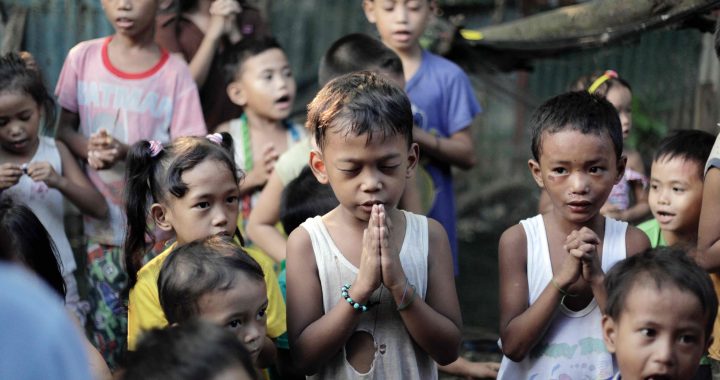The way to eternal life is to be like innocent little ones before the Father
One of my favourite saints is St Joseph of Cupertino ((1603-1663) because he was the quintessential village idiot. He was such a dunce that nobody wanted him, not even his mother. Ridiculed for his intellectual and social difficulties, Joseph sought to join a religious order to find acceptance and survive. But many rejected him. Except one that admitted him into their order and assigned him only menial tasks. Even such simple chores proved difficult for Joseph to accomplish satisfactorily and he was eventually asked to leave the order.
Joseph’s ineptitude and low intelligence, though, did not stop God from choosing him to be His priest who gave himself up entirely to a life of devotion to the Lord and His Church. His life was marked with simplicity, innocence and obedience, and such was his holiness that he was canonised in 1767, about a century after his death.
There is no shortage of such men and women in the mould of St Joseph of Cupertino.
The illiterate saints whom God chooses
In Asia, there is Korea’s St. Agatha Kim A-gi (1787-1839), who longed for baptism even though her intellectual disability made it impossible for her to learn the faith. Even the Hail Mary was too much for her. When asked to recite various prayers, Agatha would reply, “I only know Jesus and Mary.”
No matter how hard she tried, Agatha couldn’t memorise anything and was denied baptism. She lived during the persecution of Christians in Korea and was arrested and ordered to denounce her faith under torture. Her response to her torturers was the same, “I only know Jesus and Mary.” She was baptised in prison shortly before her martyrdom.
There were other countless saints who could not read and write, such as Juan Diego of Guadalupe, Bernadette Soubirous of Lourdes, Catherine of Siena, Joan of Arc, and China’s Zhang Huailu, to name a few. But they were giants of the faith and not ignorant of Christ. St Catherine has even become a Doctor of the Church!
St Zhang (1843-1900), who was baptised in his sixties, said, “No matter what happens, I do love God with my whole heart. God saves my soul. It doesn’t matter that I cannot read.”
They seemed to be the anomaly to St Jerome’s teaching that the Bible is an instrument “by which God speaks every day to the faithful” and becomes a stimulus and source of Christian life for all situations and for each person.
To make his point, St Jerome wrote to a young noblewoman from Rome, saying, “To read Scripture is to converse with God: ‘if you are praying, you are speaking with the Bridegroom, if you are reading, it is He who is speaking to you.’”
In his catechesis on 14 November 2007, Pope Benedict XVI further quotes the saint that “The study of and meditation on Scripture renders man wise and serene.”
But how do we reconcile the wisdom of St Jerome with the illiterates of the world? There are many in poverty-stricken countries, namely in Asia, Africa and Latin America, who do not have access to education. For them, it is a luxury to be able to learn how to read and write. There are also others who may have gone to school but are not cut out for intense learning.
Are these people relegated to not knowing Christ more deeply?
In a word, no. God does not exclude anyone from knowing Him.

The Mass teaches and preaches the Gospel
From the beginning of time in the Old Testament and in the Gospel to the first millennium of Christianity, the principal way of coming to know the Word of God is through hearing from learned ministers of the Word. This was and is still the chief means of transmitting the Good News of His Salvation.
When Christ issued the Great Commission to His disciples, He said to them, “Go therefore and make disciples of all nations, baptising them in the name of the Father and of the Son and of the Holy Spirit, teaching them to observe all that I have commanded you, and lo, I am with you always, to the close of the age.” (Matthew 28:16-20)
Elsewhere in the Gospel, He commanded them to “Go into all the world and preach the Gospel to the whole creation”. (Mark 16:14-16, Luke 24:46-48) because “He who hears you, hears me … will have eternal life.” (Luke 10:16, John 5:24)
The key words are “teach” and “preach”, and today we are fed these in the liturgies. This is the point that Benedict XVI in the first part of his catechesis on St Jerome on 7 November makes, “The privileged place for reading and listening to the Word of God is the liturgy, in which, celebrating the Word and making Christ’s Body present in the Sacrament, we actualise the Word in our lives and make it present among us.”
In the Mass, the Gospel is proclaimed alongside the readings of the Old Testament and Book of Psalms in the Liturgy of the Word. All three are preached and expounded during the homily. In the Liturgy of the Eucharist, the Holy Spirit makes present all the saving events of Christ’s Paschal Mystery: from His institution of the Holy Eucharist and Passion to Resurrection and Ascension to Heaven.
At the Mass, all – those who can’t read and those who can – encounter God to know Him even more deeply.
Where else do we come to know Christ?
We continue to learn about Him in the various devotional prayers, especially in the Rosary where the most important milestones of His life – from birth and mission to His Passion, Resurrection and Ascension – are respectively recalled and meditated upon in the Joyful, Light, Sorrowful and Glorious mysteries. The Divine Mercy Chaplet also teaches us about God’s inexhaustible mercy to save sinners, even the most wretched, through the Passion of His only Son.
The liturgies and devotional prayers give every Catholic access to know God that is already written down in the Bible. The lowliest among us, who for one reason or another cannot be literate students of Scriptures, are not excluded from knowing Him.
We must be committed to hearing the Gospel
What is required, though, is an unrelenting commitment to hear and receive Him in the Mass and leading a devout prayer life, just as Saints Joseph of Cupertino, Agatha Kim A-gi, Zhang Huailu and others like them did.
God meets us where we are, regardless of whether we are fortunate to get an education or not. He never stops doing so and gives us the grace to know and have faith in Him.
For those who have the capacity to grow in intellectual faith, the onus is on them to teach others about the written word in the simplest terms. Because as Christ tells us in His prayer to the Father in Matthew 11:25 that although the Lord of heaven and earth has hidden these things from the wise and the learned, He has revealed them to little ones.
Having intellectual faith is commendable and encouraged for those who can rise to the demands of acquiring knowledge. But unless we become like the “little ones” it is not enough to get us to heaven.
This is because those who are childlike before the Father – as the simple Christian is – have, through His grace, the mysteries of the Kingdom of Heaven.
Truly, I say to you, unless you turn and become like children, you will never enter the kingdom of heaven.”
Matthew 18:3
Main image: Rad Penamora, Unsplash
